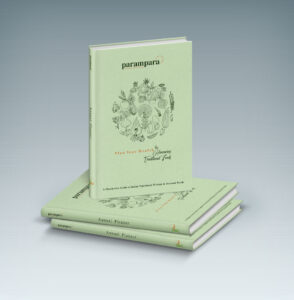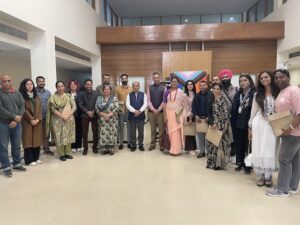 Presenting an exclusive interview with Nutritionist and Certified Diabetes Educator, Madhavi Karmokar Sharma who has recently also launched her Nutrition Calendar called ‘Parampara’.
Presenting an exclusive interview with Nutritionist and Certified Diabetes Educator, Madhavi Karmokar Sharma who has recently also launched her Nutrition Calendar called ‘Parampara’.
Tell us about your journey as a nutritionist so far?
In my nearly 2-decade long career, in India and abroad, I have worked with people from diverse backgrounds to help them with their health conditions using nutrition therapy. In 2012, I started my own venture – Informed Health to empower people to make informed choices on eating right. I see the simple tool of food educating people transform health and improve their quality of life and it’s very rewarding to be able to assist people in the most fundamental aspect of their life- health
Your latest nutrition calendar is seen to be the talk of the town. Tell us more about it?
Parampara: A month wise guide to Indian nutritional wisdom and seasonal food is my humble attempt towards unearthing the deeper connection between seasons, festive rituals, food choices and health. This concept-based planner is designed with the intention to help people overcome their fear of food and look at it as the greatest blessing- anna is purna Brahma. It’s designed with an intention to help people eat local, seasonal and traditional food. Eating in this manner is the only way to make diet sustainable. A sustainable diet, not a fad diet is the secret to lifelong health.
What are some key findings that the readers can find in the calendar?
The planner design is simple. Each month begins with details of the season and weather in that month, and the corresponding impact on the body. Food wisdom to help you align your body to every weather is explained. There is a mention of the traditional festivals and rituals falling in each month. A section titled “Let’s decode the Rituals” helps unravel the ‘science’ that our ancestors beautifully weaved into a story or fable for the larger purpose of health and vitality. Festive Delicacies and Seasonal Foods for the month are also highlighted.
What are some nutrition myths that you would like to shatter?
Nutritional myths I would like to shatter are:
Fat is bad
Putting a blanket ban of fat is wrong. Fat is an essential nutrient of a balanced diet and serves many metabolic functions in the body. Including good sources of fat like nuts, seeds, ghee, dairy, coconuts, peanuts, helps the body to function optimally. Going fat free and choosing low fat versions of foods may not be the right choice as they are often loaded with added sugar and other unhealthy ingredients.
You need exotic foods to stay healthy.
Food cooked in your kitchen is the food that can safely keep you in the best of your health. Foods that feature on your plate should be the local food of the season, cooked in a traditional style. Eg. Haldi has been an inherent component of all Indian recipes. But now people eat raw or boiled food and take haldi shots or haldi pills!
There is enough stress in life, let food be simple. Food is communication within your body. Eating helps your body to decode and keep the communication running smoothly in the body, thereby keeping you in good health.
Festivals are roadblocks in our health journey
Festive delicacies are meticulously engineered combinations of ingredients that when combined in the right proportion helps you to boost your health in a specific season. Eg) Thandaai is a tasty and nourishing blend of herbs and spices that prepare us for the onset of summers and boost immunity. Or using singghare ka atta during Navratri is a great alternative cereal to improve gut health.
Festivals are the deliberate breaks in our eating routines that help build diversity in our menus. Diversity in food systems is the key to health and wellbeing.
Three nutrition tips for our readers?
Follow the 80/20 rule:
Stick to home cooked meals 80% of the time. The remaining 20 % you may choose to eat out. People tend to do the opposite. Planning ahead of time and doing basic preparation over the weekends can help you organize your weekly menus smartly.
Embrace Diversity in your meals
Packaged breakfast cereals have replaced the regional breakfast menus in many households in India. This homogeneity compromises gut health in the long run. Embracing cultural diversity, preserving traditional recipes and taking pride in eating home cooked meals is the secret to sustainable planet and sustainable health
Eat early dinners.
Indian dinners generally come very late. Try to prepone and finish your meal latest by 8 pm. Keeping a clear 2-3 hour gap between dinner and bed time help proper digestion. This assists in good quality sleep. Sleep is where the magic of good health happens!







Comments are closed.